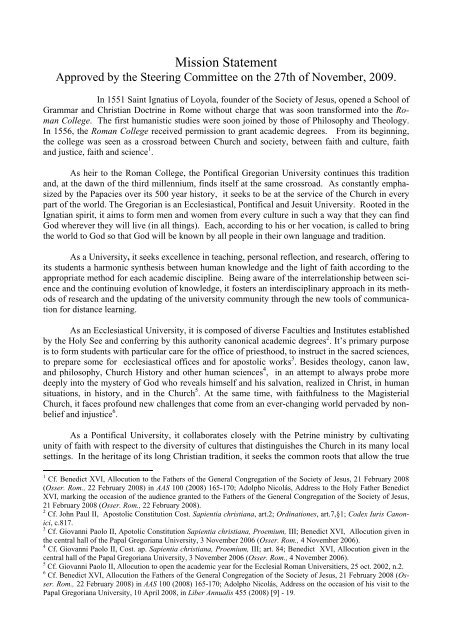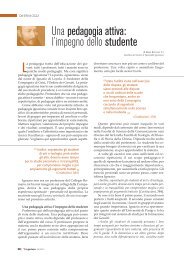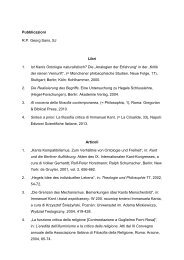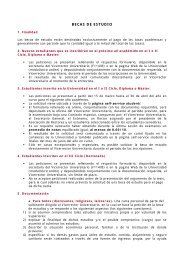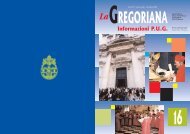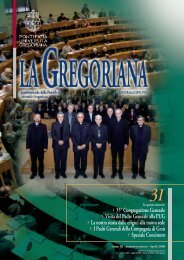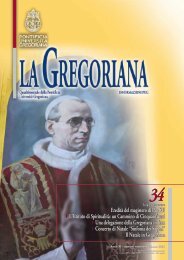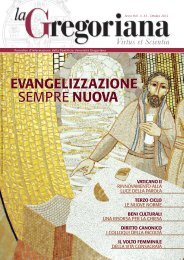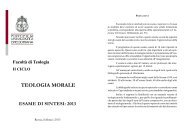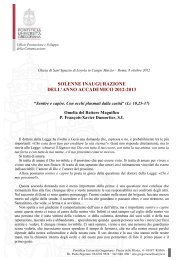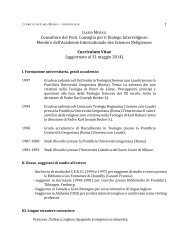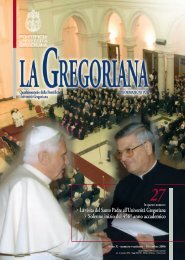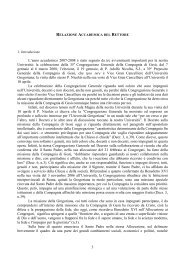Mission Statement - Pontifical Gregorian University
Mission Statement - Pontifical Gregorian University
Mission Statement - Pontifical Gregorian University
You also want an ePaper? Increase the reach of your titles
YUMPU automatically turns print PDFs into web optimized ePapers that Google loves.
<strong>Mission</strong> <strong>Statement</strong>Approved by the Steering Committee on the 27th of November, 2009.In 1551 Saint Ignatius of Loyola, founder of the Society of Jesus, opened a School ofGrammar and Christian Doctrine in Rome without charge that was soon transformed into the RomanCollege. The first humanistic studies were soon joined by those of Philosophy and Theology.In 1556, the Roman College received permission to grant academic degrees. From its beginning,the college was seen as a crossroad between Church and society, between faith and culture, faithand justice, faith and science 1 .As heir to the Roman College, the <strong>Pontifical</strong> <strong>Gregorian</strong> <strong>University</strong> continues this traditionand, at the dawn of the third millennium, finds itself at the same crossroad. As constantly emphasizedby the Papacies over its 500 year history, it seeks to be at the service of the Church in everypart of the world. The <strong>Gregorian</strong> is an Ecclesiastical, <strong>Pontifical</strong> and Jesuit <strong>University</strong>. Rooted in theIgnatian spirit, it aims to form men and women from every culture in such a way that they can findGod wherever they will live (in all things). Each, according to his or her vocation, is called to bringthe world to God so that God will be known by all people in their own language and tradition.As a <strong>University</strong>, it seeks excellence in teaching, personal reflection, and research, offering toits students a harmonic synthesis between human knowledge and the light of faith according to theappropriate method for each academic discipline. Being aware of the interrelationship between scienceand the continuing evolution of knowledge, it fosters an interdisciplinary approach in its methodsof research and the updating of the university community through the new tools of communicationfor distance learning.As an Ecclesiastical <strong>University</strong>, it is composed of diverse Faculties and Institutes establishedby the Holy See and conferring by this authority canonical academic degrees 2 . It’s primary purposeis to form students with particular care for the office of priesthood, to instruct in the sacred sciences,to prepare some for ecclesiastical offices and for apostolic works 3 . Besides theology, canon law,and philosophy, Church History and other human sciences 4 , in an attempt to always probe moredeeply into the mystery of God who reveals himself and his salvation, realized in Christ, in humansituations, in history, and in the Church 5 . At the same time, with faithfulness to the MagisterialChurch, it faces profound new challenges that come from an ever-changing world pervaded by nonbeliefand injustice 6 .As a <strong>Pontifical</strong> <strong>University</strong>, it collaborates closely with the Petrine ministry by cultivatingunity of faith with respect to the diversity of cultures that distinguishes the Church in its many localsettings. In the heritage of its long Christian tradition, it seeks the common roots that allow the true1 Cf. Benedict XVI, Allocution to the Fathers of the General Congregation of the Society of Jesus, 21 February 2008(Osser. Rom., 22 February 2008) in AAS 100 (2008) 165-170; Adolpho Nicolás, Address to the Holy Father BenedictXVI, marking the occasion of the audience granted to the Fathers of the General Congregation of the Society of Jesus,21 February 2008 (Osser. Rom., 22 February 2008).2 Cf. John Paul II, Apostolic Constitution Cost. Sapientia christiana, art.2; Ordinationes, art.7,§1; Codex Iuris Canonici,c.817.3 Cf. Giovanni Paolo II, Apotolic Constitution Sapientia christiana, Proemium, III; Benedict XVI, Allocution given inthe central hall of the Papal <strong>Gregorian</strong>a <strong>University</strong>, 3 November 2006 (Osser. Rom., 4 November 2006).4 Cf. Giovanni Paolo II, Cost. ap. Sapientia christiana, Proemium, III; art. 84; Benedict XVI, Allocution given in thecentral hall of the Papal <strong>Gregorian</strong>a <strong>University</strong>, 3 November 2006 (Osser. Rom., 4 November 2006).5 Cf. Giovanni Paolo II, Allocution to open the academic year for the Ecclesial Roman Universitiers, 25 oct. 2002, n.2.6 Cf. Benedict XVI, Allocution the Fathers of the General Congregation of the Society of Jesus, 21 February 2008 (Osser.Rom., 22 February 2008) in AAS 100 (2008) 165-170; Adolpho Nicolás, Address on the occasion of his visit to thePapal <strong>Gregorian</strong>a <strong>University</strong>, 10 April 2008, in Liber Annualis 455 (2008) [9] - 19.
faith to illuminate the plurality of existing situations in today’s world as it is moving toward socialand economic globalization 7 .As a Jesuit <strong>University</strong>, and thus animated by the Ignatian spirit, it is characterized by itsavailability for service to the Holy See 8 . Its pedagogy, rooted in the personal and professional relationshipbetween professors and students, insists more on the assimilation of wisdom than on themultiplication of knowledge. It promotes an interdisciplinary approach that gives students an integralformation. It offers a mentoring relationship aimed at the development of his or her personality,at greater inner freedom and at accepting personal responsibility. With creative fidelity, it acceptsand communicates the ecclesial values that are hallmarks of the Society of Jesus as imperative inGod’s plan for humanity: the social sense of a faith that works for peace, truth and justice; dialoguewith the world of culture and science; the promotion of Christian unity and interreligious dialogue;the value and dignity of each person and of creation itself 9 .As a university at the service of the Church around the world it seriously seeks to maintainthe universality of its own teaching body. It takes to heart the necessary incarnation of the gospelmessage. It animates and encourages all members of the university community to be attentive andfaithful to the Magisterial Church and to the particular circumstances of local Churches, in order tostrive to live together in solidarity as children of One God.7 Cf. Adolfo Nicholás, Address on the occasion of his visit to the <strong>Pontifical</strong> <strong>Gregorian</strong> <strong>University</strong>, 10 aprile 2008 , inLiber Annualis 455 (2008) [9]-19.8 Cf. Benedetto XVI, Allocution given in the central hall of the <strong>Pontifical</strong> <strong>Gregorian</strong>a <strong>University</strong>, 3 November 2006(Osser. Rom., 4 November 2006).9 Cf. Benedict XVI, Cf. Benedict XVI, Allocution to the Fathers of the General Congregation of the Society of Jesus, 21February 2008 (Osser. Rom., 22 February 2008) in AAS 100 (2008) 165-170; Adolpho Nicolás, Address to the Holy FatherBenedict XVI, marking the occasion of the audience granted to the Fathers of the General Congregation of the Societyof Jesus, 21 February 2008 (Osser. Rom., 22 February 2008).


